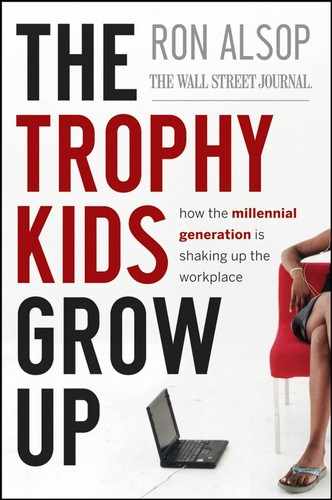3.5. BREAKING AWAY
Because some millennials have come to rely so heavily on their parents' advice, college counselors question whether they're being suffocated or supported. Helicopter parents may indeed be toxic, hampering their children's need to become self-reliant and face inevitable obstacles and disappointments in life. They may be producing a generation of very needy adults who can't think for themselves. One young woman regretfully told me, "My parents' views have become my own. I cannot claim originality when it comes to my ideas." And on an Internet blog about helicopter parents, a young man wrote, "As I got older, the struggle for independence was always there. I was always depressed, but I always put on a front to appease my parents. . . . There is a difference between being there for your children and being a helicopter parent. All of the parents out there who think they were just doing what was best for their children are fooling themselves. It's more convenient and more socially acceptable if your children are successful, but for your children to be better people, you need to know when not to help get rid of a problematic situation but to help give them support to get through it and let them know that they can do it."
Experience Inc., a Boston-based career services firm, surveyed college students and recent graduates in 2006 and found that a quarter of the respondents felt that parents were overly involved to the point that it was annoying or embarrassing. More than a third said parents had called into or attended meetings with academic advisers; 31% said parents had contacted professors to complain about a grade.
In some cases, it's a symbiotic relationship. The children want all the help—and money—they can get from their parents. Parents have even taken sabbaticals from their jobs to devote their full attention to the college application process. What's more, some college students e-mail their class assignments to their parents to edit before turning them in to their professors. In the Experience Inc. survey, about two-thirds of the respondents said they still seek counsel from parents on academic and career issues.
But some millennials crave more independence. Lindsay Ronga, a very successful millennial, wants to be more self-reliant, but knows it won't be easy. Never mind that she has reached her mid-20s and become an M.B.A. student at Harvard Business School, after having worked in the demanding fields of investment banking and private equity. Like many millennials, she still continues to consult her parents for advice even when she knows she should think for herself.
The business school application process was stressful, with tears and angry words exchanged sometimes when she consulted her parents for advice. "With every essay I wrote, I was on the phone with my father, getting his input," she recalls. "He sometimes tore my essays to shreds, and for the most part, I'd say I incorporated a moderate amount of his suggestions. It almost seemed as if he himself was applying sometimes, and I had to remind him it was me." As for her mother during the application process, "I love her to death," Ronga says, "though I got frustrated with her toward the end and politely requested that she not give me any more input." Ultimately, Ronga made her parents quite proud, gaining admission to all four of the schools she applied to.
She says she came to realize that she had worked in banking and private equity mostly to please her parents. At the time, she felt it was the right thing to do. But now she would like to move out of finance and if possible, find a career in the wine industry, her true passion. "I hope to become more independent and need less guidance and direction," she says. "But my friends and I still talk to our parents almost on a daily basis; it's just natural to us. I believe my generation loves guidance and wants to run everything—whether school, jobs, or dating—by our parents and friends."
Some parents realize that they must start backing off to avoid handicapping their children for life. They need to encourage their kids to make their own decisions and learn from the inevitable mistakes they will make. But they aren't moving into the background easily. Many parents object to what they perceive to be a move by colleges and employers to shove them aside. They argue that since preschool they have been encouraged to be partners with their children's teachers and coaches. Now everyone suddenly wants them to vanish.
"It was a mantra throughout my children's school years that parents need to be involved in their kids' lives," says Kim Foley, a Boston-area mother of two college students. "It was a badge of honor if you became a Girl Scout or Boy Scout leader, knew all the teachers' names, went to the school's parent night, and were aware that your child was reading Mark Twain this week." Then boom! "All of a sudden," she continues, "you're expected to shut it off in college. I just don't think that's right. Students want to continue the relationships that were developed over the years and need their parents' involvement in working through the big bureaucracies of large colleges."
She finds it ironic that universities ask undergraduate parents to donate to their fundraising campaigns, yet discourage them from questioning a professor's teaching style. "I'm not calling the professors, but I do want to know how their classes are going," she says. She puts her foot down, though, about some requests from her children. When her daughter was unhappy with her roommate assignment, she asked her mother to change it. "I knew I couldn't get a different roommate even if I called because the school wouldn't listen to her or to me," Foley says. "But I felt it was inappropriate to even make the call. I told my daughter that I can't always fix things."
